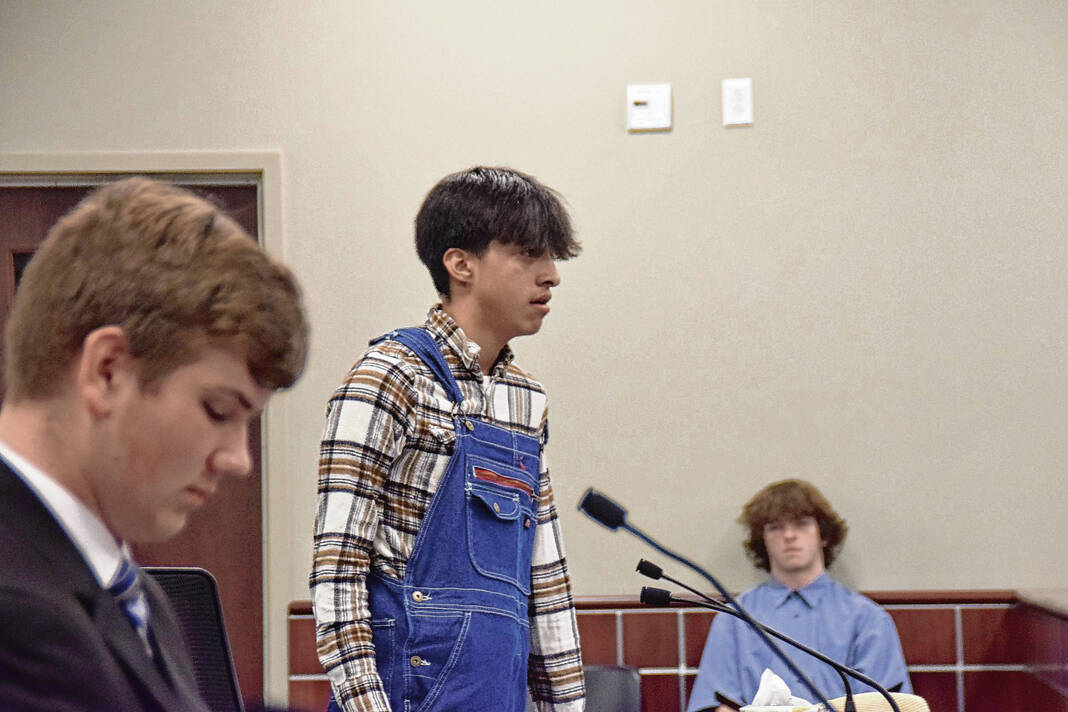
Seymour High School freshman Angel Garcia portrays Tom Robinson in the trial in Harper Lee’s novel ‘To Kill a Mockingbird’ with Paulton Rennekamp, left, playing the role of the prosecutor, Mr. Gilmer, in the Jackson Superior Court I courtroom in Brownstown on April 21.
Submitted photo | Katie Cottrill
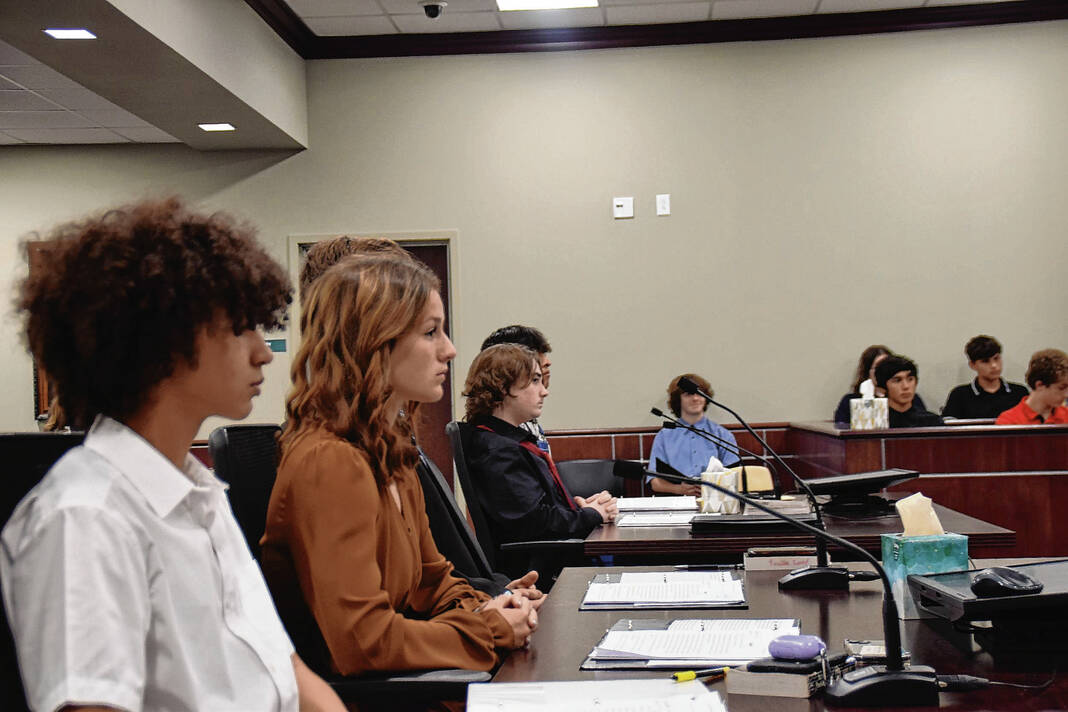
Maddox Sanchez, left, as Bob Ewell and Kennedy Burnette as Mayella Ewell, the girl who accuses Tom Robinson of rape, during the re-enactment of the trial in ‘To Kill a Mockingbird.’
Submitted photo | Katie Cottrill
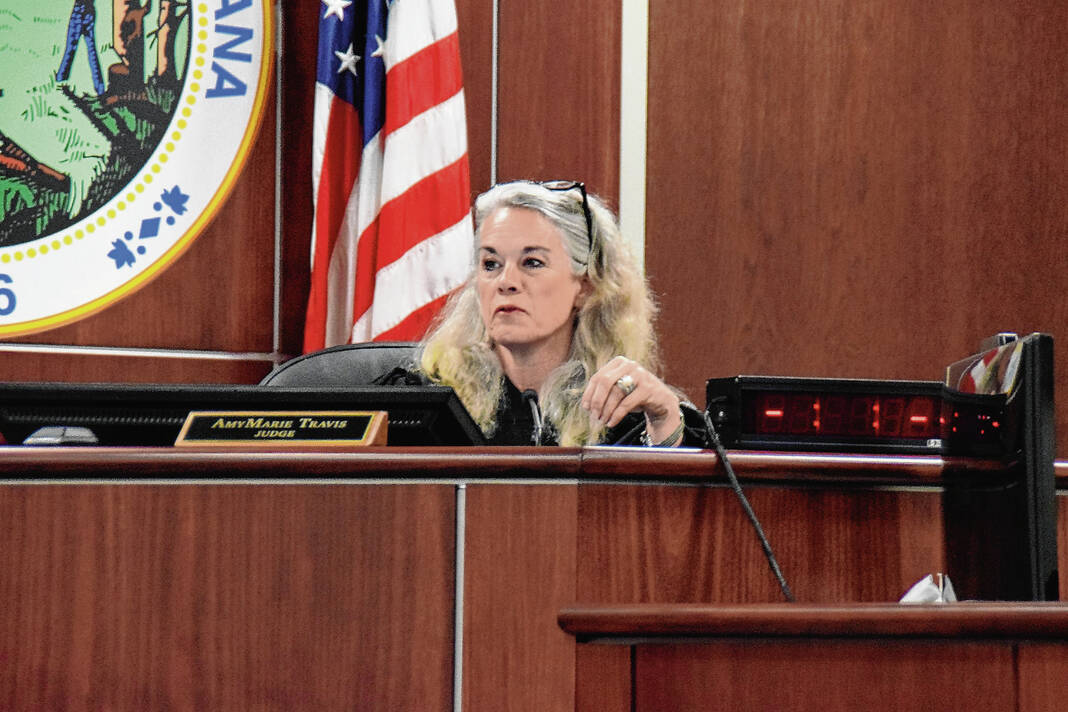
Jackson Superior Court I Judge AmyMarie Travis portrays Judge John Taylor in the trial of Tom Robinson in re-enactment of ‘To Kill a Mockingbird’ by Seymour High School students in the courtroom in Brownstown.
Submitted photo | Katie Cottrill
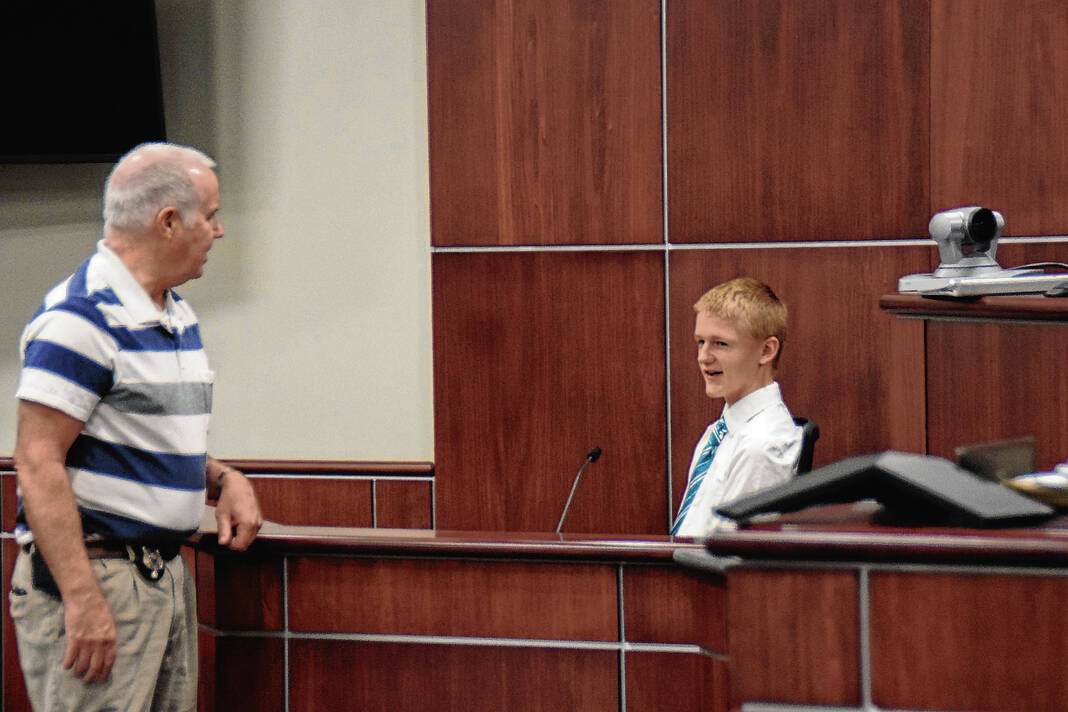
Court bailiff Phil Nale, left, instructs Brian Westmoreland, right, as he portrays Sheriff Heck Tate in the trial of Tom Robinson at the Jackson Superior Court I courtroom in Brownstown.
Submitted photo | Katie Cottrill
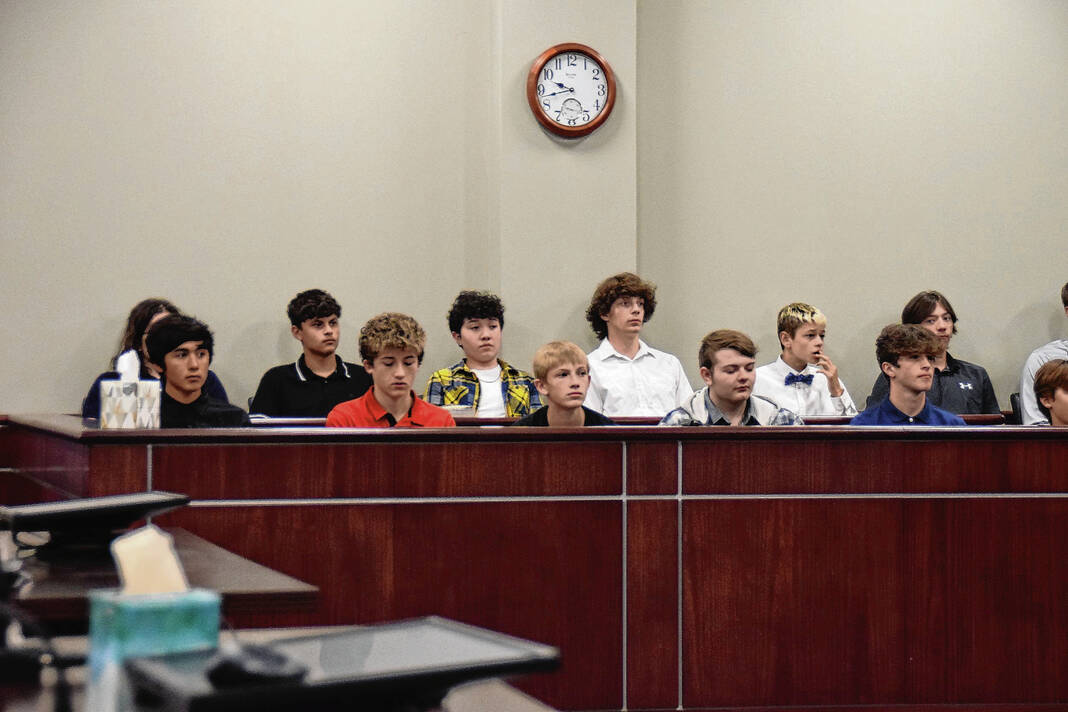
Preparing to state their guilty verdicts are, front from left, Dakota Cooper, Dominic Dennis, Nate Fritsch, Charlie Bruce and Tyson Hillian, and back from left, Isaac Rust, Jayden Shuffitt, Carter Ames, Cam Edwards, Micah Jablonski, Lincoln Morford and Chase Smith.
Submitted photo | Katie Cottrill
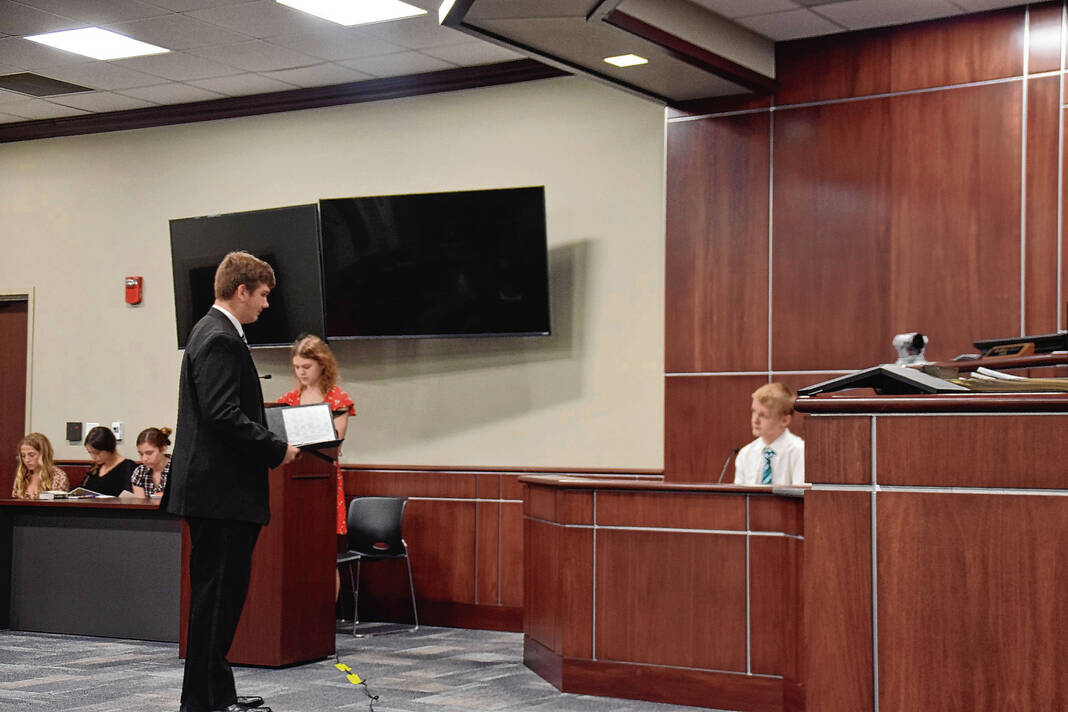
Paulton Rennekamp, left, portraying prosecutor Mr. Gilmer, questions the witness, Brian Westmoreland, portraying Sheriff Heck Tate.
Submitted photo | Katie Cottrill
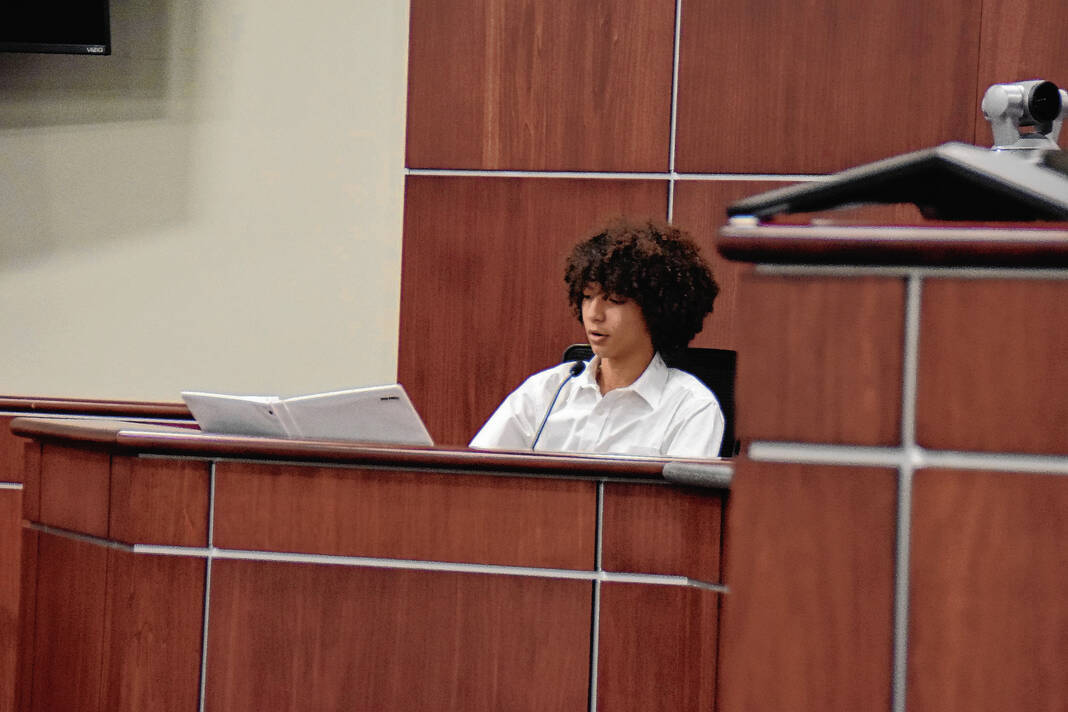
Maddox Sanchez, portraying Bob Ewell, shares his testimony at the re-enactment of the Tom Robinson trial in the Jackson Superior Court I courtroom in Brownstown.
Submitted photo | Katie Cottrill
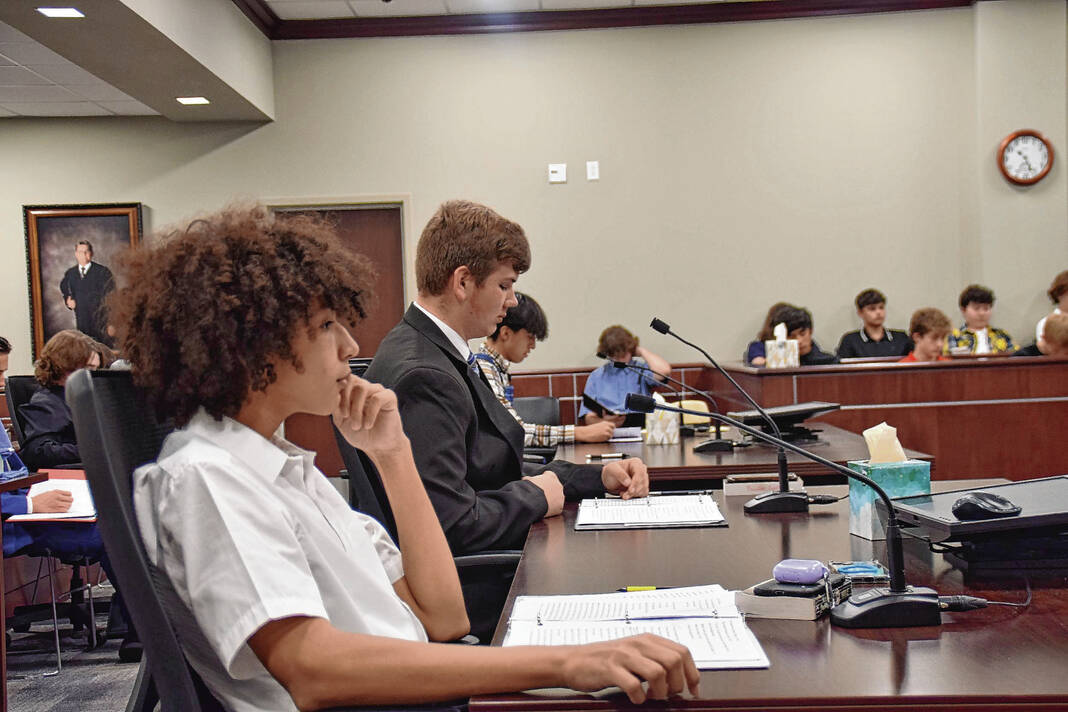
Bob Ewell, played by Maddox Sanchez, left, watches his daughter give her testimony during the Tom Robinson trial at the Jackson Superior Court I courtroom in Brownstown.
Submitted photo | Katie Cottrill
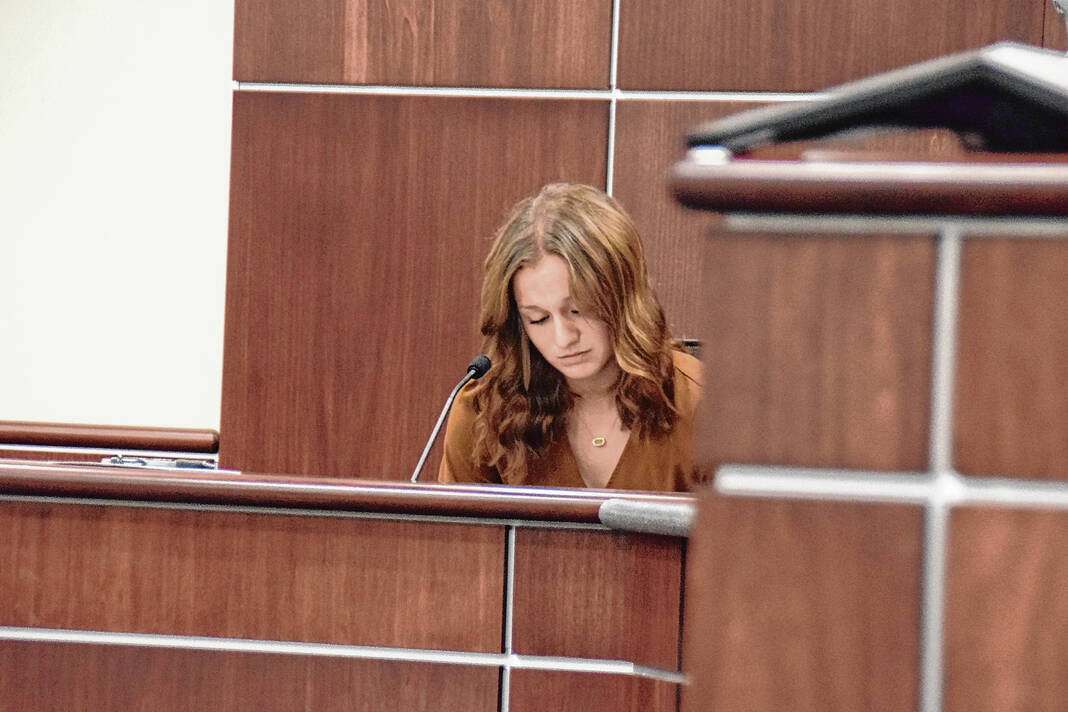
Mayella Ewell, portrayed by Kennedy Burnette, looks away from Atticus Finch during cross-examination during the trial of Tom Robinson at the Jackson Superior Court I courtroom in Brownstown.
Submitted photo | Katie Cottrill
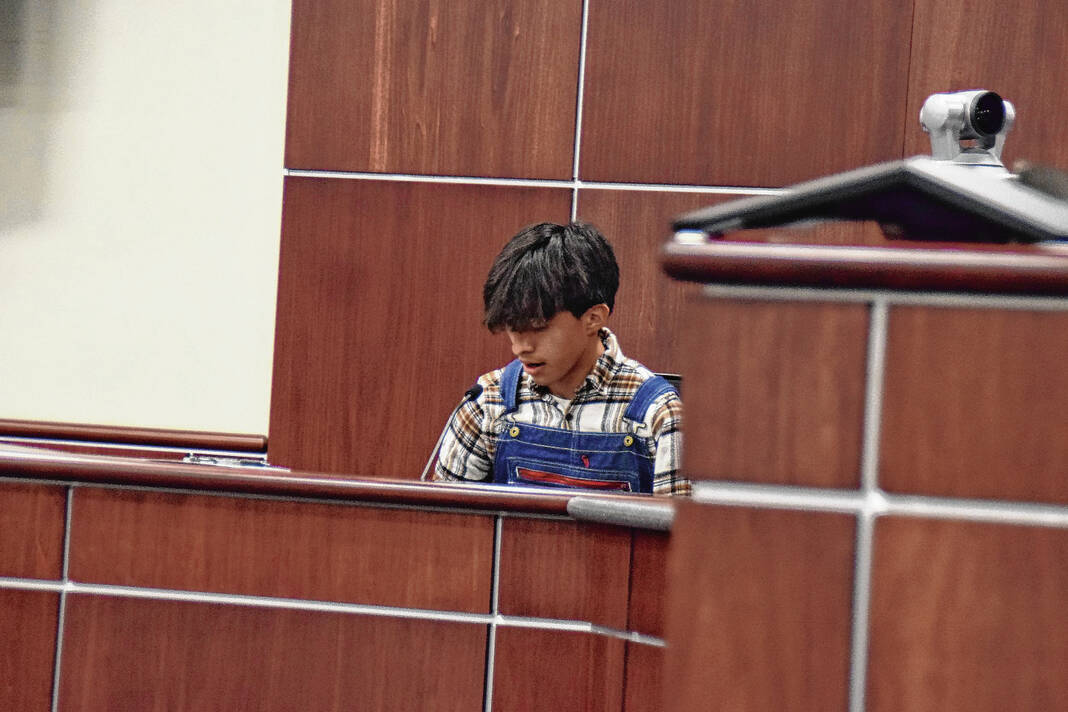
Tom Robinson, played by Angel Garcia, gives his testimony during the trial at the Jackson Superior Court I courtroom in Brownstown.
Submitted photo | Katie Cottrill
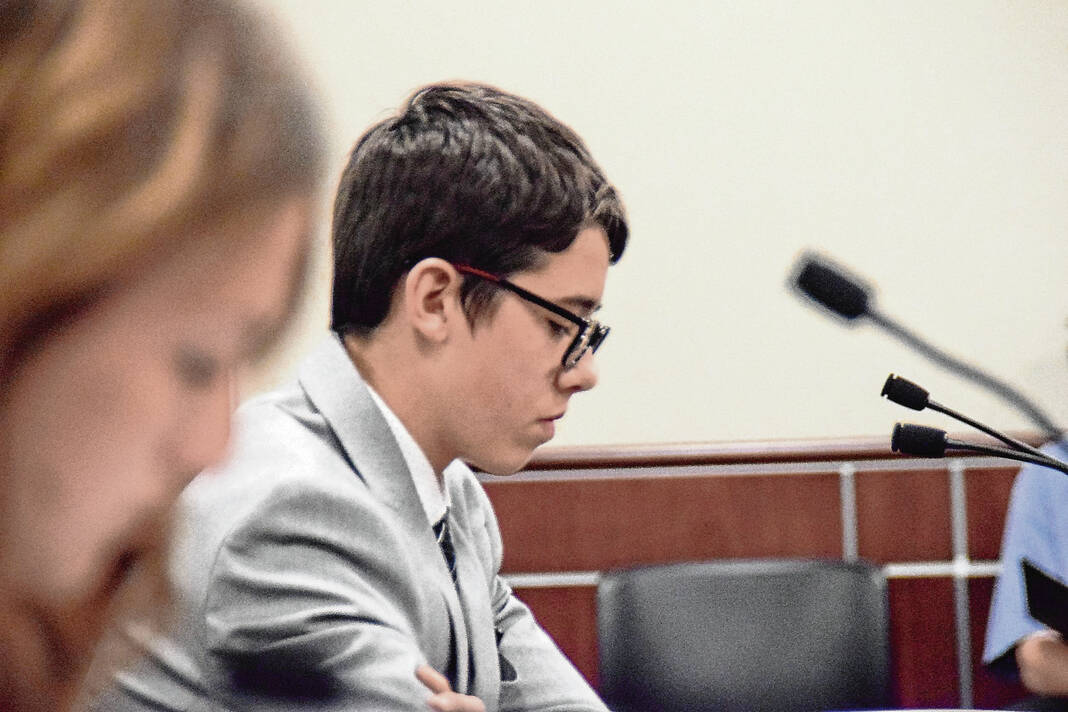
Abram Goldsberry portrayed defense attorney Atticus Finch during the re-enactment of the Tom Robinson trial at the Jackson Superior Court I courtroom in Brownstown.
Submitted photo | Katie Cottrill
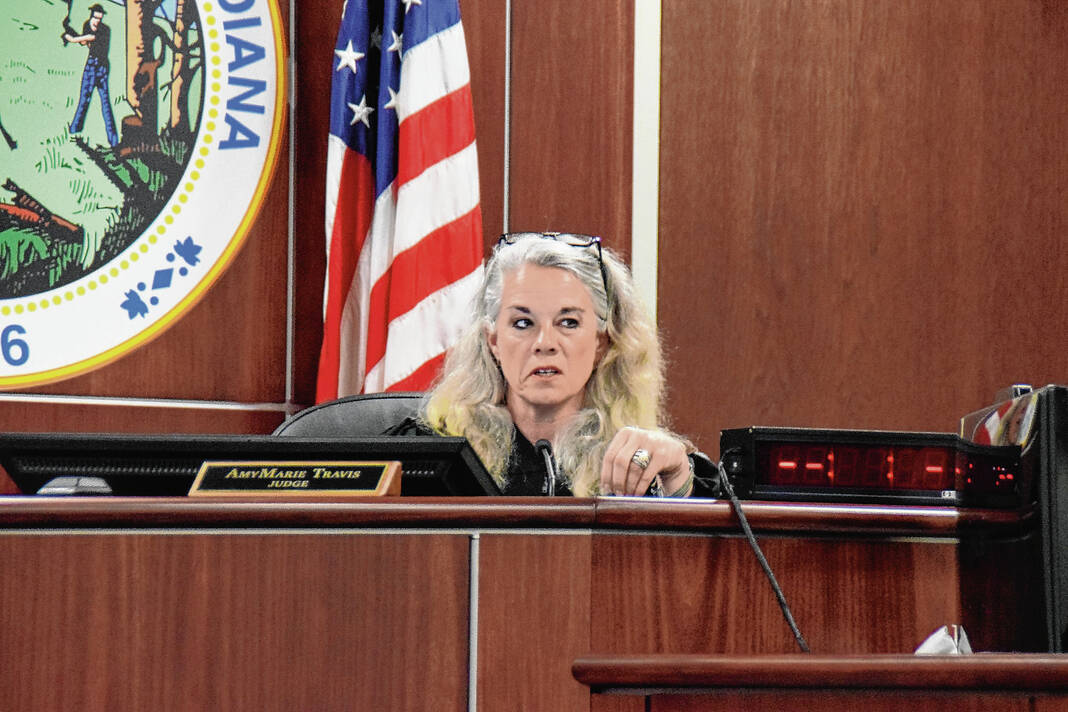
Jackson Superior Court I Judge AmyMarie Travis in action as she portrays Judge John Taylor in the re-enactment of the Tom Robinson trial in her courtroom in Brownstown.
Submitted photo | Katie Cottrill
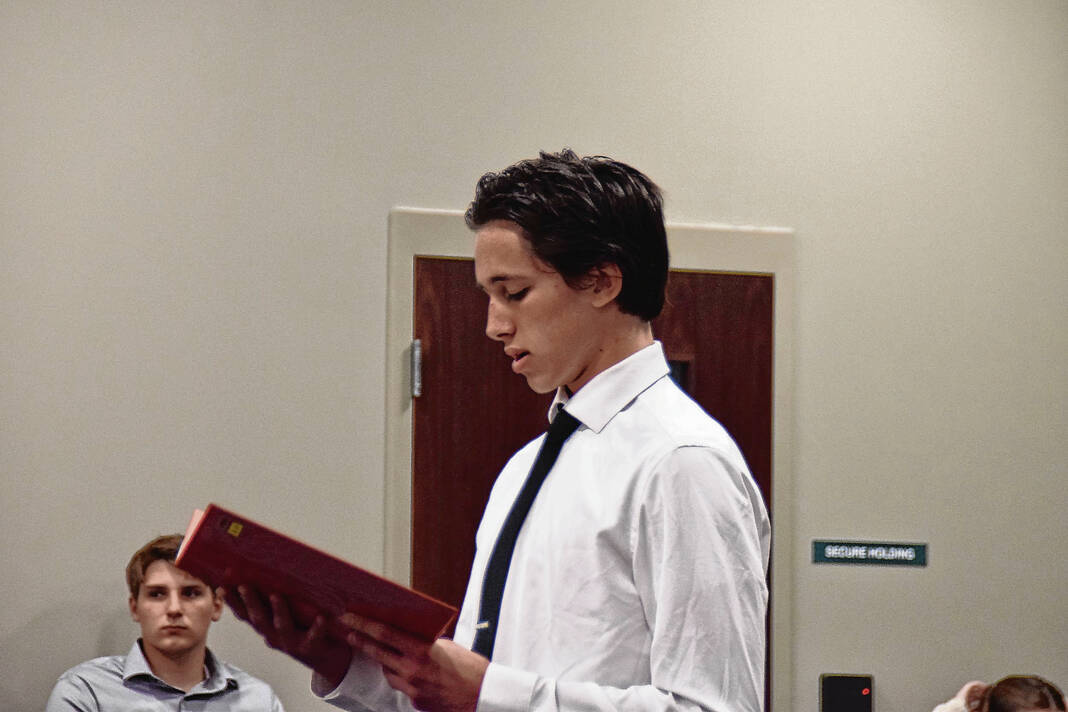
Atticus Finch, played by Lane Mellencamp, gives his closing arguments to the jury regarding Tom Robinson’s innocence at the Jackson Superior Court I courtroom in Brownstown.
Submitted photo | Katie Cottrill
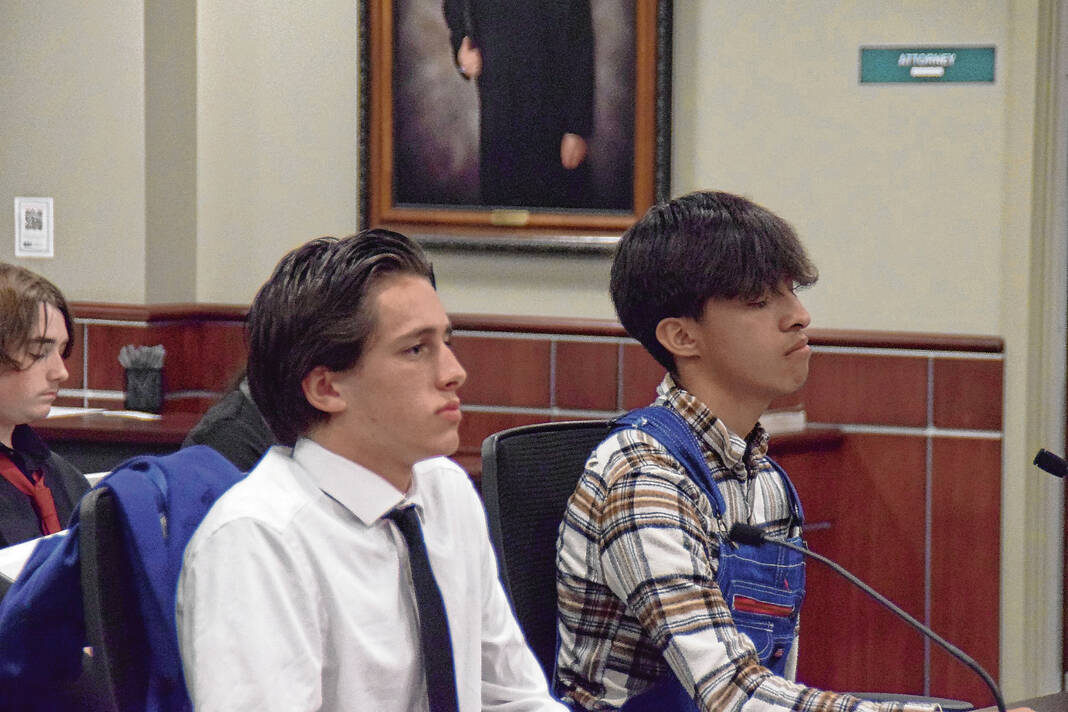
Atticus Finch, played by Lane Mellencamp, left, and his defendant, Tom Robinson, played by Angel Garcia, wait for the jury’s verdict at the Jackson Superior Court I courtroom in Brownstown.
Submitted photo | Katie Cottrill
Racial inequality, injustice and innocence destroyed by evil are topics Laura Cottrill’s students recently experienced as they put on the shoes of the characters in Harper Lee’s novel, “To Kill a Mockingbird.”
English 9 honors students at Seymour High School traveled to the Jackson Superior Court I courtroom in Brownstown on April 21 to bring the trial of Tom Robinson to life.
“Being a person of color in the South puts you in a perspective where it feels like the whole world hates you,” said Angel Garcia, who portrayed Tom Robinson. “Becoming Tom showed me a perspective of a man who lives in fear but still tries to make his days the best they can be.”
Lee’s novel follows the idea of innocence in the southern town of Maycomb, Alabama, in the midst of the Great Depression. This sleepy town, however, soon comes alive with the crisis of racism and prejudice as Atticus Finch takes on Robinson as his client, a Black man accused of raping a white woman.
In the remaining chapters of the novel, it takes the reader through the trial of Robinson and his sad but unfortunately not shocking demise as the all-white jury slaps Robinson with a guilty verdict.
While the novel is fiction, Cottrill’s students were able to learn about court proceedings and how a trial is conducted with presiding Jackson Superior Court I Judge AmyMarie Travis holding the gavel and playing a role, as well.
Cottrill said this project began in 2013 when she and her colleagues decided to take their sophomore classes, who were reading the novel “12 Angry Men,” to the courthouse to learn more about jury duty.
Travis decided to do a mock voir dire with the class, a preliminary examination of a witness or juror by the judge or counsel. The following year, Cottrill began to teach English 9 honors and asked Travis if she would partner again to recreate Tom Robinson’s trial.
A few obstacles, including the COVID-19 pandemic and the bustling environment of the courthouse, have not always allowed every class to view a live court proceeding, but this project is something Cottrill always looks forward to when teaching trial content.
“This was my fifth time heading to Brownstown and my sixth time working with Judge Travis, who is an excellent partner sharing the intricacies of our court system,” she said.
Travis said it is always exciting to see the young people bring a trial to life, and she loves to see them learn about how the court operates. She also said it’s interesting to see how the justice system worked in the 1930s versus how it functions today.
“As a judge, we follow a strict adherence to evidence. We always keep a straight face and provide a neutral stance in the court,” Travis said. “It’s also interesting to see the gavel used in this trial for I have only used it mostly for ceremonial purposes.”
Travis also said it’s interesting to see how times have changed regarding jury duty and court proceedings as she shared a fact with the students that in 1968, Mississippi was the last state to change its law to allow women to serve on the jury.
Paulton Rennekamp played the prosecuting attorney, Mr. Gilmer, for Bob Ewell, who had accused Robinson of raping his daughter, Mayella. He said this was his first time reading through the novel and said it was an excellent read.
“The book and this trial teach us the problem with racial injustice and that the world is not all sunshine and rainbows,” he said.
Rennekamp also said he learned what it was like to be an attorney arguing a case and would consider the occupation as a possible career path.
Many students said the trial allowed them to step inside their character during that moment in time and learn how the court system has changed.
Kennedy Burnette, who played Mayella Ewell, said the experience was eye-opening.
“I felt very connected to this role as I forgot who Kennedy was and just played Mayella,” she said.
Even though Burnette knew what the verdict was going to be, she said it still felt very wrong.
“He was cheated out of justice,” she said. “Tom Robinson, a Black man, should not have had to stand there to defend himself as a handful of white men go against him.”
Cottrill said the students learn a powerful lesson in both justice and injustice as they head back to school to debrief after the mock trail to watch a film called “Just Mercy.”
“Just Mercy” is the true story of a Black man named Walter McMillian, who was sentenced to death for the murder of a white woman that he didn’t commit.
McMillian’s attorney, Bryan Stevenson, perseveres through the case even though McMillian’s guilty verdict sent him to death row. His verdict was finally overturned in 2022, and Cottrill said the students cheered when they heard the news.
“My heart absolutely melted because they got it,” she said.
In the film, Stevenson believes “the true measure of our commitment to justice, the character of our society, our commitment to the rule of law, fairness and equality cannot be measured by how we treat the rich, the powerful, the privileged and the respected among us. The true measure of our character is how we treat the poor, the disfavored, the accused, the incarcerated and the condemned.”
Cottrill said it is important to know that if society is educating a population to care for one another and to stand in each other’s shoes as Atticus teaches, the future can only improve.
